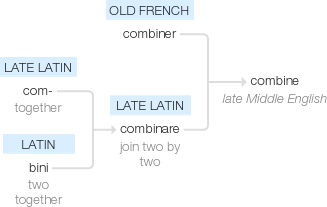Combine
late Middle English: from Old French combiner or late Latin combinare ‘join two by two’, from com- ‘together’ + Latin bini ‘two together’.
wiktionary
From Middle French combiner, from Late Latin combīnāre, present active infinitive of combīnō(“unite, yoke together”), from Latin con-(“together”) + bīnī(“two by two”).
etymonline
combine (v.)
early 15c., "to associate, unite, join two or more things together" (transitive), from Old French combiner (14c.) and directly from Late Latin combinare "to unite, yoke together," from Latin com "with, together" (see com-) + bini "two by two," adverb from bi- "twice" (from PIE root *dwo- "two"). Intransitive sense "unite, coalesce, come together into one body" is from 1712. Related: Combinative; combined; combining.
combine (n.)
"machine that cuts, threshes, and cleans grain," 1900, short for combine harvester, combine mower (1857), from combine (v.). The noun was used earlier in the sense "conspiracy" (c. 1600); it became obsolete but was revived (1886) in the sense "combination or agreement between persons to further common interests."
